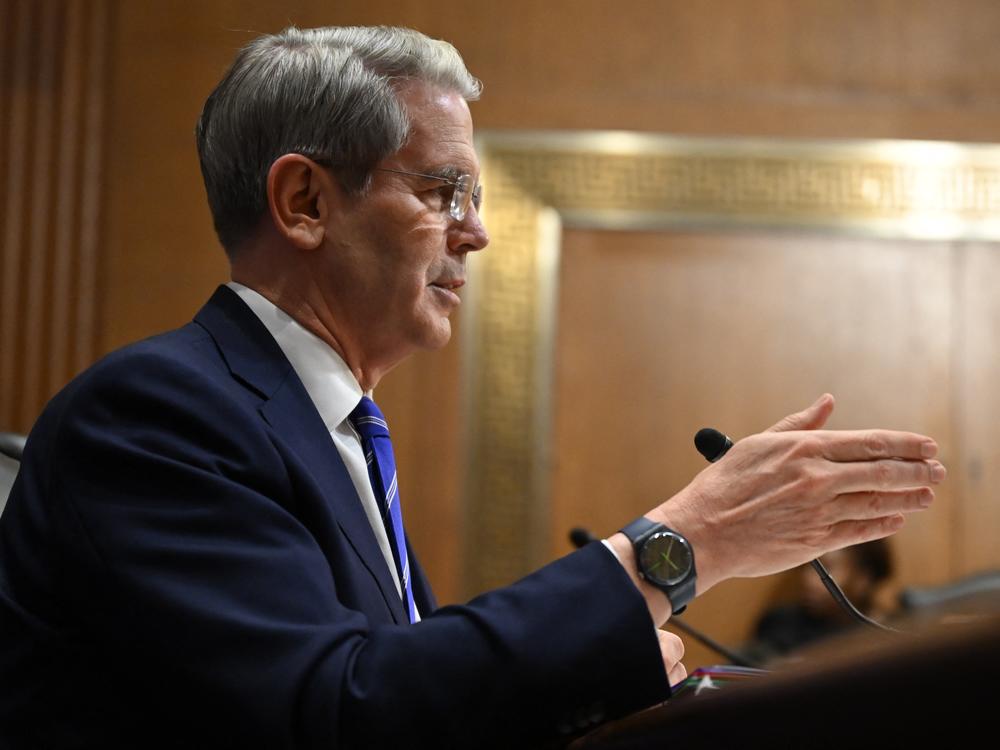Section Branding
Header Content
Trump's pick for Treasury Secretary is Scott Bessent. Here's what to know
Primary Content
We're following the confirmation hearings for the incoming Trump administration. See our full politics coverage, and follow NPR's Trump's Terms podcast or sign up for our Politics newsletter to stay up to date.
Who: Scott Bessent
Nominated for: Secretary of Treasury
You might know them from: The longtime investor and hedge fund manager was little known outside of Wall Street until he became one of the top economic advisers to President-elect Donald Trump's campaign.
- Bessent is a former protégé of George Soros, the billionaire investor and Democratic mega donor.
- After Trump won the election in November, Bessent won an unusually public – and messy – contest to be nominated for the Treasury Secretary role.
- His husband and children sat behind Bessent at today's hearing. If confirmed, he will become the first openly gay, Senate-confirmed Cabinet official in a Republican administration.
What does this role do: The Secretary of the Treasury advises on economic policy and the financial system. If confirmed, Bessent will be responsible for implementing Trump's proposed economic policies, including tax cuts and sweeping tariffs.
Here's what happened at the hearing
Trump's promised tax cuts, and their potential consequences for the U.S. economy, took center stage at Bessent's confirmation hearing.
"This is the single most important economic issue of the day," Bessent told members of the Senate Finance Committee. "This is pass-fail. If we do not fix these tax cuts, if we do not renew and extend, then we will be facing an economic calamity, and as always, with financial instability that falls on the middle and working class."
Trump overhauled the tax code during his first administration, in 2017. The changes are largely set to expire this year – meaning that his second administration will have an opportunity to again reshape tax policy for years to come.
Over more than three hours, Bessent calmly fielded questions from Democrats and praise from Republicans. Sen. Mike Crapo, the Idaho Republican who now chairs the committee, praised Bessent for his "very, very straightforward, courteous, and honorable" responses, as well as his underlying qualifications for the job: "Your background, your training, everything is tailor-made for this role."
Democrats repeatedly pressed Bessent over the impact of Trump's proposed tax cuts on the national deficit and on income inequality in the United States. The nonpartisan Committee for a Responsible Federal Budget has estimated that extending the 2017 law would increase the national debt by more than $4 trillion over the next 10 years.
"We want a tax code that gives everyone in America a chance to get ahead … and there's a long way to go to get it done," Sen. Ron Wyden, D-Ore., said in his closing remarks.
Bessent also fielded questions over many of Trump's other proposed economic policies. Tariffs have been a particularly contentious topic: Economists warn that Trump's sweeping proposals could restart inflation.
But Bessent downplayed these concerns. At one point, Sen. Maggie Hassan, D-N.H., asked Bessent if he thought any of Trump's economic policies would increase inflation.
"Nothing I can immediately think of," Bessent responded.
A South Carolina native turned Wall Street investor, Bessent repeatedly argued that he would prioritize Main Street consumers over his wealthy peers.
"I believe Wall Street has done great the past few years, and that Main Street has suffered. I think it's Main Street's time," Bessent said.
Bessent owns assets worth at least $500 million, and potentially much more, according to his personal financial disclosures. If confirmed, he would be a member of the wealthiest White House ever.
In his farewell address on Wednesday evening, President Biden warned "an oligarchy is taking shape in America of extreme wealth, power and influence that literally threatens our entire democracy, our basic rights and freedoms and a fair shot for everyone to get ahead."
At Thursday's hearing, Vermont Sen. Bernie Sanders, an independent who caucuses with Democrats, asked Bessent if he agreed with Biden. Bessent did not directly answer the question.

